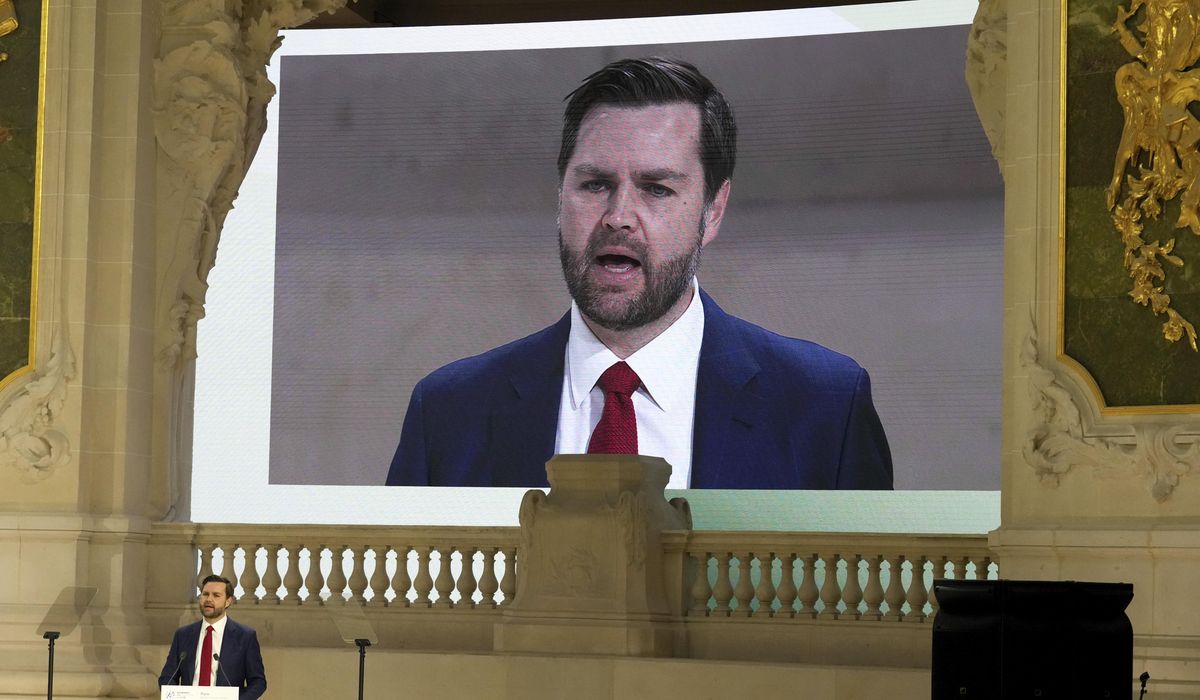


Vice President J.D. Vance outlined a new distinctly U.S. vision on Tuesday for artificial intelligence growth, one that focuses on innovation over fear of anything that might go wrong with the new technology.
In his first foreign trip since taking office, Mr. Vance told an audience of world leaders and tech titans gathered in Paris this week that he was focused on “AI opportunity” before “AI safety,” which he said was a previous summit’s focus.
“The AI future is not going to be won by hand-wringing about safety,” Mr. Vance said. “It will be won by building — from reliable power plants to the manufacturing facilities that can produce the chips of the future.”
Mr. Vance invited foreign partners to join with American firms for AI development, but he warned against those who think they can take advantage of U.S. businesses and the new administration. The EU has proposed a far more restrictive framework for developing the booming technology.
“The Trump administration is troubled by reports that some foreign governments are considering tightening the screws on U.S. tech companies with international footprints,” Mr. Vance said. “Now, America cannot and will not accept that, and we think it’s a terrible mistake, not just for the United States of America, but for your own countries.”
As Google CEO Sundar Pichai and French President Emmanuel Macron looked on, Mr. Vance detailed the new administration’s argument against over-regulating AI.
“We believe that excessive regulation of the AI sector could kill a transformative industry just as it’s taking off, and we’ll make every effort to encourage pro-growth AI policies,” Mr. Vance said.
Echoing complaints from conservatives about a number of the top online platforms, Mr. Vance said the Trump administration wanted AI to be free from bias and censorship, and the new administration would maintain an approach to AI that benefits workers.
The vice president praised Indian Prime Minister Narendra Modi’s view of AI as enhancing and not supplanting workers. Mr. Modi co-chaired the AI Action Summit with Mr. Macron, and the Indian leader is headed to the U.S. to meet with President Trump later this week.
“AI, I really believe, will facilitate and make people more productive. It is not going to replace human beings, it will never replace human beings,” Mr. Vance said. “And I think too many of the leaders in the AI industry, when they talk about this fear of replacing workers, I think they really miss the point — AI, we believe, is going to make us more productive, more prosperous, and more free.”
The AI Action Summit is a key recruiting ground for nations and tech moguls to persuade the rest of the world to adopt their vision of the technology’s future.
The U.S. pointedly refused to join more than 60 nations attending the summit in signing a pledge to “promote AI accessibility to reduce digital divides” and “ensure AI is open, inclusive, transparent, ethical, safe, secure, and trustworthy.” It also called for “making AI sustainable for people and the planet” and protecting “human rights, gender equality, linguistic diversity, consumer rights and intellectual property.”
In an unexpected move, China, represented in Paris by a personal emissary of President Xi Jinping, signed the pledge, even though it is seen as the chief competitor to the U.S. in the race to develop AI applications.
While America’s European Union counterparts have moved more aggressively to pursue regulation than the U.S. government, Mr. Vance made an explicit overture encouraging Europe to start anew.
The vice president said recognizing America is the leader in AI, and prioritizing America first, did not mean the U.S. wanted or needed to go it alone.
“America wants to partner with all of you, and we want to embark on the AI revolution before us with the spirit of openness and collaboration,” he said. “But to create that kind of trust, we need international regulatory regimes that fosters the creation of AI technology rather than strangles it and we need our European friends, in particular, to look to this new frontier with optimism rather than trepidation.”
• Ryan Lovelace can be reached at rlovelace@washingtontimes.com.
